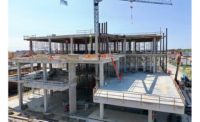Related Link:
ENR Texas & Louisiana 2023 Top Specialty Contractors
The specialty construction market continues to grow in the U.S., adding more than 600,000 positions nationwide since 2020, according to the Associated Builders and Contractors Association. However, specialty contractors continue to experience major issues in finding employees and in coping with ways to manage rising material prices.
An examination of revenue figures submitted by top regional firms ranked by ENR Texas and Louisiana shows companies in Texas, Louisiana, Mississippi, Arkansas and Oklahoma were busy. Regional specialty contractors reported a 27% increase in 2022 revenue to $8.193 billion compared with the prior year, according to ENR data.
This trend is particularly apparent when examining revenue of the Top 10 firms, which experienced a 51% hike from 2021, to $5.841 billion, the data shows.
Texas and other Southern states such as Tennessee and Georgia dominate in terms of adding the most jobs in specialty construction. Austin and Dallas rank among the top six U.S. cities supporting specialty contractor jobs, according to a recent ABC report.

TD Industries was part of the team that built the Global Life Field in Arlington, Texas.
Image courtesy of TD Industries
That Austin and Dallas are in the top six should not be a surprise, as much of Texas is seeing the effects of massive migration to the state. This has bolstered specialty trade opportunities, especially in residential categories. Of 634,000 specialty contractor jobs added nationwide, three out of four are in the residential sector, says Anirban Basu, ABC national chief economist.
Texas and the rest of the region are the benefactors of above average employment growth, according to Basu.
The nonresidential sector also has experienced significant job growth, he says. Communities across the region are “generating substantial new opportunities for subcontractors due to megaprojects associated with manufacturing.”
Even with people flocking to the ENR Texas and Louisiana region, finding talent remains a struggle for firms in the specialty trade sector.
Ed White, president at Dallas-based mechanical construction company TD Industries, said talent acquisition remains a top issue.
Given the training required for these trades, a one-size-fits-all solution is not possible, the executive says. Specialty contractors surveyed by Dodge Construction and Procore reported that 90% of their projects experienced negative impacts in moving to completion because of the skilled labor shortage.
The outlook is even bleaker, with a major proportion of specialty tradespeople set to retire in the next decade, according to ABC. Its survey found large specialty construction companies are reporting a level of pending retirements at 39%, while smaller companies reported a 26% rate.
“The demand for construction services remains high,” says White. “The industry will have to devote significant resources to growing its talent pipeline.”

TD Industries provided mechanical and plumbing systems for the 515-ft-tall Frost Tower in Fort Worth.
Image courtesy of TD Industries
To address its worker shortage, the company frequently reviews pay levels across the entire organization and provides a flexible work environment for employees. “We have obtained feedback from our workforce and strive to implement iMprovements that will increase engagement and satisfaction,” he says.
Materials price increases are another issue impacting companies in the region. Gordian, a construction cost data tracking firm, found that those costs vital to building have increased by double digits this year: steel jumped 22%, wood increased 16%, concrete/masonry rose 15% and insulation climbed 11%.
Companies said they are searching for cost-saving opportunities in material purchases, especially since they are also seeing an escalation in labor costs.
The challenges have come as most specialty construction companies emerge from the pandemic.
For TD Industries, the challenges did not impact the company last year, which White attributes to “ample work” in most of its markets. This allowed the firm to be more selective in projects it undertook, he says.
“This gives us the ability to focus on our customers and continue to nurture long-lasting relationship,” he adds.






Post a comment to this article
Report Abusive Comment